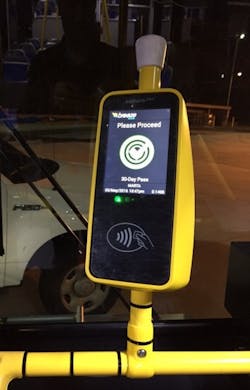Rather than pay for journeys using cash, or queue to top up their Breeze smart card, passengers will be able to buy tickets online through their smartphone. Breeze Mobile is reliant on a QR code-based ticket platform, which is available through a mobile app, and validates travel for users when entering and leaving the metro system, and boarding and disembarking a bus.
Spanning 48 miles of metro lines and 92 bus routes covering nearly 1,400 miles, Atlanta possesses the ninth largest urban transportation system in the United States, serving more than 500,000 people every weekday.
MARTA has already deployed the Breeze smart card with great success. Rolled out in 2006, it now supports 103 million passenger journeys annually covering both MARTA's Rapid Rail metro and bus services.
The new mobile ticketing system is an add-on to the Breeze system and will also be available to use on Georgia Regional Transportation Authority's transit buses, the Atlanta Streetcar, as well as bus services operated by Gwinnett County Transit and CobbLinc. This means more people will have access to modern ticketing helping to improve public transport integration in the region.
Kapsch was selected for the $10 million contract, which includes a 7-year warranty/maintenance period, after it proved the validity of the mobile ticketing system during an extensive and competitive pilot program and successfully bidding for and winning the contract.
Working with its partners on the project, sister companies Kapsch CarrierCom and Kapsch Public TransportCom, Kapsch TrafficCom conducted full testing of the system in a real-world environment. This involved installing the hardware containing the QR code reader on the metro network's gates and on bus ticket validators. The key components of the system were then tested initially by MARTA staff, who provided valuable feedback, ahead of a two-week employee pilot, followed by four weeks of testing by everyday passengers.
System Rollout
After the contract had been secured, the focus was on rolling out the system within the 18-month deadline.
For MARTA this will involve installing metrogate validators on 642 bi-directional gates at 38 rail stations, as well as bus validators on 565 fixed-route and 211 paratransit buses. In addition, installation is required on GRTA's 166 fixed-route buses, the 71 fixed-route and 10 paratransit buses operated by Gwinnett County Transit, Cobb County Transit's 84 fixed-route and 29 paratransit buses, and the 16 light rail vehicles operated by Atlanta Streetcar.
As well as hardware installation, work is also set to take place to finalize the system architecture for the mobile ticketing system. Indeed, configuring the mobile app, customer website, back office website and regional capability is the first phase of the rollout process.
With mobi.guider Pure, Kapsch will supply the commercial and operational back office. Bytemark will provide a mobile app for iOS and Android, customer service tools and the customer website. All Bytemark components are integrated with the Kapsch commercial back office while another partner, TransTrack Systems, will provide customized dashboards and reporting.
Once finalized, the focus will shift to hardware installation, with one bi-directional lane expected to be installed at every metro station by October 2017, and all station work completed by Fall 2018. Upgrades to validators on fixed-route buses will be completed by November 2017, and installation on paratransit vehicles will take place over the winter. The regional rollout will be finalized in Spring 2018.
As it pushes ahead with the Atlanta rollout, and looks “Forward to the future of transport ticketing,” Kapsch is showcasing its mobile ticketing system at Booth 2808 in Hall B.


